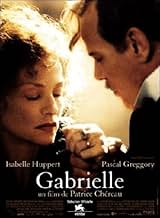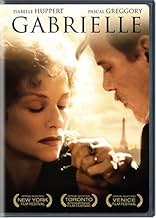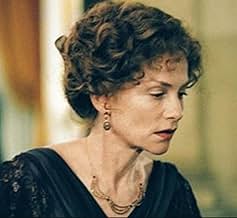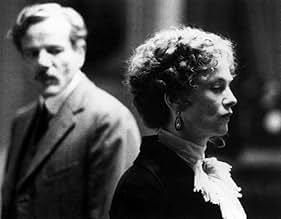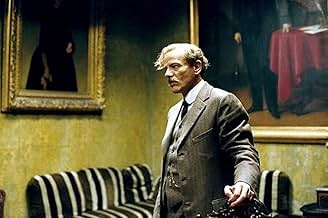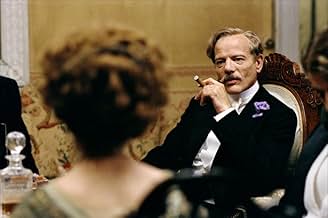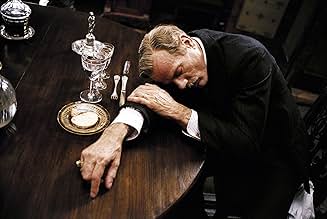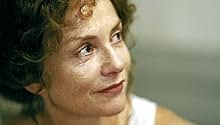Gabrielle
- 2005
- 1h 30min
VALUTAZIONE IMDb
6,2/10
2181
LA TUA VALUTAZIONE
Aggiungi una trama nella tua linguaThe marriage between Gabrielle and Jean begins to fray after the discovery of a letter that belongs to Gabrielle.The marriage between Gabrielle and Jean begins to fray after the discovery of a letter that belongs to Gabrielle.The marriage between Gabrielle and Jean begins to fray after the discovery of a letter that belongs to Gabrielle.
- Regia
- Sceneggiatura
- Star
- Premi
- 3 vittorie e 6 candidature totali
Florent Bigot de Nesles
- Invité
- (non citato nei titoli originali)
Philippe Calvario
- Guest
- (non citato nei titoli originali)
Recensioni in evidenza
Obviously we don't all like the same things. One commentator said it was all just talk, as if that were a bad thing. I happen to love language and words, and in particular love the French language. So that is the reason I rent a movie in French. I also have a very strong aversion to "action movies" where language is reduced to "Ow! Help! Duck!" On the other hand, movies like Gabrielle where minute movements of the psyche are explored in depth by minimalistic means, these are what grip me, move me, keep me interested. I do not really think the movie is like an opera -- it was more like a french play -- the delivery and velocity of the spoken word was very much in the style of french live theater.
My only caveat is that French-ness and Conrad seem a strange mix to me. There was another French movie that was made on a Conrad text, and I had a similar reaction. Conrad is not writing about French society. And yet the action has been transplanted to France. And it seems an entirely incongruous transplant to me -- plopping the joyless uprightness of puritanical England (the only place name mentioned is "West End Station" into a such a lively Latin culture which has always had a much more relaxed attitude towards love and sex... well,to me it's just incongruous.
Nevertheless, it was an cleverly crafted movie, and the musical score by Fabio Vacchi was unearthly beautiful.
My only caveat is that French-ness and Conrad seem a strange mix to me. There was another French movie that was made on a Conrad text, and I had a similar reaction. Conrad is not writing about French society. And yet the action has been transplanted to France. And it seems an entirely incongruous transplant to me -- plopping the joyless uprightness of puritanical England (the only place name mentioned is "West End Station" into a such a lively Latin culture which has always had a much more relaxed attitude towards love and sex... well,to me it's just incongruous.
Nevertheless, it was an cleverly crafted movie, and the musical score by Fabio Vacchi was unearthly beautiful.
I've been watching & thoroughly enjoying Isabelle Huppert's films since 'The Lacemaker'. This time, what struck me was the intensity of Huppert's next-to-passive, almost casually indifferent postures of contempt for her husband. It is because of her being so minimal and apathetic that her performance harnesses its power and devastation. And this is what enhances Greggory's reactive performance as being so complementary, that of a once smug now tortured soul who slips and struggles to re-grasp a heart turned cold. He's just left grabbing air in the end. The looks on the faces of the chorus, their social clique & the servants in the troubled Hervey household says it all.
Going in, I was reminded of another story of martial discord, David Hughes Jone's 'Betrayal' but 'Gabrielle' hit me as being more incisive and oppressive than anything I've seen adapted for Pinter. I don't need to state the obvious that parlor films of this variety appeal only to those with an acquired taste. As for me, I can only say that I prefer the ice cubes that go with my scotch jagged & stinging cold like the ingredients in this film.
Going in, I was reminded of another story of martial discord, David Hughes Jone's 'Betrayal' but 'Gabrielle' hit me as being more incisive and oppressive than anything I've seen adapted for Pinter. I don't need to state the obvious that parlor films of this variety appeal only to those with an acquired taste. As for me, I can only say that I prefer the ice cubes that go with my scotch jagged & stinging cold like the ingredients in this film.
10Peegee-3
This incredible adaptation of Joseph Conrad's story,"The Return" has been haunting me for days. The visual beauty of its cinematography in contrast to the devastating psychological and emotional pain of its characters, brilliantly portrayed by Isabelle Huppert and Pascal Gregory. has rarely been achieved in film. No need here to repeat the details of the story...I do however want to point out what I have not read in any reviews or comments...that this is basically, as I see it, an evocation of the power and control struggle in a marriage...that moves between husband and wife in the most fascinating and brilliant way. My most grateful appreciation and admiration to Patrice Chereau for giving us this remarkable film. In a time of blockbuster, action movies, what a joy to experience a work of art that provides intense emotion, intelligent food for thought and visual nurturance.
French language period set chick flick that was so banally turgid and pretentious that I wanted to scratch thine own eyes out in those brief lucid periods I was awake. One thing I did share with what I expect the females in the audience were experiencing was the shedding of tears, the stark difference being that mine were tears of blood. If it had been a play I would have rushed out, brought a gun, then rushed back to shoot the actors on stage for in my opinion they deserve nothing but death. Put briefly, in turn of the century Paris a rather arrogant man rather abruptly finds out that his wife of 10 years desires to leave him for another man. Much talking is done. Then much more talking is done. This is followed by lengthy periods of talking. More talking. Then wrapped up with, surprisingly, talking. But it's all done in an almost monologue method , briefly interspersed with large titles on screen which I expect the makers of the movie thought to be profound yet I found completely ridiculous (the film ends with the words "AND HE NEVER RETURNED!". I thought it rude of me to puke on the floor of so gorgeous a theatre (the State in Sydney, such a beautiful and elaborate place) so I resisted with all my might). I left the cinema with a headache. Not in any way due to the complexity and depth of the story I'd just seen, but because I just wasted what I now consider to be the most valuable 90 minutes of my life ever. Even now I want to cry.
I see a great number of art-house films, so I'm not a pop culture heathen and I own many great titles in my own private DVD collection that I watch and treasure. I have nothing against glacial pacing, indeed for many wonderful films it is often delicious to slowly savour the unfolding occurrences (In My Fathers Den, Lantana, Insomnia, Mar Adentro etc) and my own favorites are indie films like Requiem For A Dream and Mysterious Skin (tho honestly a film one need watch only once due to its power and disturbing subject matter). But in this instance I would never have thought a "French language art-house drama" would be the type of film that in my opinion, gives the Adam Sandler film The Waterboy a run for it's money.
Complete dross.
I see a great number of art-house films, so I'm not a pop culture heathen and I own many great titles in my own private DVD collection that I watch and treasure. I have nothing against glacial pacing, indeed for many wonderful films it is often delicious to slowly savour the unfolding occurrences (In My Fathers Den, Lantana, Insomnia, Mar Adentro etc) and my own favorites are indie films like Requiem For A Dream and Mysterious Skin (tho honestly a film one need watch only once due to its power and disturbing subject matter). But in this instance I would never have thought a "French language art-house drama" would be the type of film that in my opinion, gives the Adam Sandler film The Waterboy a run for it's money.
Complete dross.
Joseph Conrad wrote his novella, "The Return" in tribute to Henry James, whose "The Spolis of Poynton" inspired him to write about a man who regards people as objects of ownership-- and is gobsmacked when his most prized possession, his wife, walks out on him. On the page it's a tight little chamber piece, with overtones of Ibsen and Strindberg. On the screen the great Patrice Chereau turns it into something else -- an opera in which the images sing rather than the performers. Pascale Greggory is in top form as a haute bourgeois "man who has everything" whose smugness masks a total disdain for feeling. When the superb Isabelle Huppert leaves a note to say she's leaving, the brandy decanter he drops echoes like the sword of Siegfried in Chereau's famed production of Wagner's "Ring" cycle. (Fabio Vacchi's amazing Alban Berg-like score seals the deal on this aspect of the work.) The dramatic set-to that results finds our non-hero groping for words to speak to the feelings he's never experienced before -- longing, regret, and finally grief at the loss of a love he's never allowed himself to know.
As far from Merchant-Ivory as one can possibly imagine Chereau and production designer Olivier Radot (new to la famille Chereau) place the action in a museum-like mansion where a small army of servants move about at the service of this infernal couple and their friends. Scenes of their fashionable parties suggest the Verdurins in Proust with cinematographer Eric Gauthier indulging in a color palette that makes the screen seem like a Manet come to life.
Chereau is doubtless familiar with what Georges Bataille wrote of Manet: "A little superficial perhaps, but driven by inner forces that gave him no rest, Manet was possessed by a desire for something beyond his reach which he never fully understood and which left him for ever tantalized and unsatisfied, on the brink of nervous exhaustion." That's perfect description of the emotional heart of this very great film.
As far from Merchant-Ivory as one can possibly imagine Chereau and production designer Olivier Radot (new to la famille Chereau) place the action in a museum-like mansion where a small army of servants move about at the service of this infernal couple and their friends. Scenes of their fashionable parties suggest the Verdurins in Proust with cinematographer Eric Gauthier indulging in a color palette that makes the screen seem like a Manet come to life.
Chereau is doubtless familiar with what Georges Bataille wrote of Manet: "A little superficial perhaps, but driven by inner forces that gave him no rest, Manet was possessed by a desire for something beyond his reach which he never fully understood and which left him for ever tantalized and unsatisfied, on the brink of nervous exhaustion." That's perfect description of the emotional heart of this very great film.
Lo sapevi?
- ConnessioniReferenced in Criminal Intent: Blind Spot (2006)
I più visti
Accedi per valutare e creare un elenco di titoli salvati per ottenere consigli personalizzati
- How long is Gabrielle?Powered by Alexa
Dettagli
Botteghino
- Lordo Stati Uniti e Canada
- 332.829 USD
- Fine settimana di apertura Stati Uniti e Canada
- 30.676 USD
- 16 lug 2006
- Lordo in tutto il mondo
- 2.775.311 USD
- Tempo di esecuzione1 ora 30 minuti
- Colore
- Mix di suoni
- Proporzioni
- 2.35 : 1
Contribuisci a questa pagina
Suggerisci una modifica o aggiungi i contenuti mancanti


